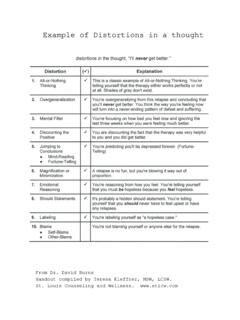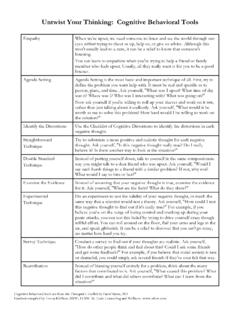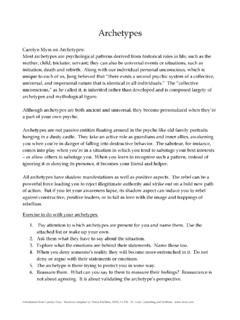Transcription of Fact Sheet on co-dependency from Mental Health America
1 From Handout compiled by Teresa kleffner , MSW, LCSW. St. Louis Counseling and Wellness. co-dependency fact Sheet on co-dependency from Mental Health America : co-dependency is a learned behavior that can be passed down from one generation to another. It is an emotional and behavioral condition that affects an individual s ability to have a healthy, mutually satisfying relationship. It is also known as relationship addiction because people with codependency often form or maintain relationships that are one-sided, emotionally destructive and/or abusive.
2 Co-dependent behavior is learned by watching and imitating other family members who display this type of behavior. Who Does co-dependency Affect? co-dependency often affects a spouse, a parent, sibling, friend, or co-worker of a person afflicted with alcohol or drug dependence. Originally, co-dependent was a term used to describe partners in chemical dependency , persons living with, or in a relationship with an addicted person. Similar patterns have been seen in people in relationships with chronically or mentally ill individuals.
3 Today, however, the term has broadened to describe any co-dependent person from any dysfunctional family. What is a Dysfunctional Family and How Does it Lead to co-dependency ? A dysfunctional family is one in which members suffer from fear, anger, pain, or shame that is ignored or denied. Underlying problems may include any of the following: An addiction by a family member to drugs, alcohol, relationships, work, food, sex, or gambling. The existence of physical, emotional, or sexual abuse. The presence of a family member suffering from a chronic Mental or physical illness.
4 Dysfunctional families do not acknowledge that problems exist. They don t talk about them or confront them. As a result, family members learn to repress emotions and disregard their own needs. They become survivors. They develop behaviors that help them deny, ignore, or avoid difficult emotions. They detach themselves. They don t talk. They don t touch. They don t confront. They don t feel. They don t trust. The identity and emotional development of the members of a dysfunctional family are often inhibited Attention and energy focus on the family member who is ill or addicted.
5 The co-dependent person typically sacrifices his or her needs to take care of a person who is sick. When co-dependents place other people s Health , welfare and safety before their own, they can lose contact with their own needs, desires, and sense of self. From Handout compiled by Teresa kleffner , MSW, LCSW. St. Louis Counseling and Wellness. How Do Co-dependent People Behave? Co-dependents have low self-esteem and look for anything outside of themselves to make them feel better. They find it hard to be themselves.
6 Some try to feel better through alcohol, drugs or nicotine - and become addicted. Others may develop compulsive behaviors like workaholism, gambling, or indiscriminate sexual activity. They have good intentions. They try to take care of a person who is experiencing difficulty, but the caretaking becomes compulsive and defeating. Co-dependents often take on a martyr s role and become benefactors to an individual in need. A wife may cover for her alcoholic husband; a mother may make excuses for a truant child; or a father may pull some strings to keep his child from suffering the consequences of delinquent behavior.
7 The problem is that these repeated rescue attempts allow the needy individual to continue on a destructive course and to become even more dependent on the unhealthy caretaking of the benefactor. As this reliance increases, the co-dependent develops a sense of reward and satisfaction from being needed. When the caretaking becomes compulsive, the co-dependent feels choiceless and helpless in the relationship, but is unable to break away from the cycle of behavior that causes it. Co-dependents view themselves as victims and are attracted to that same weakness in the love and friendship relationships.
8 Characteristics of Co-dependent People Are: An exaggerated sense of responsibility for the actions of others A tendency to confuse love and pity, with the tendency to love people they can pity and rescue A tendency to do more than their share, all of the time A tendency to become hurt when people don t recognize their efforts An unhealthy dependence on relationships. The co-dependent will do anything to hold on to a relationship to avoid the feeling of abandonment An extreme need for approval and recognition A sense of guilt when asserting themselves A compelling need to control others Lack of trust in self and/or others Fear of being abandoned or alone Difficulty identifying feelings Rigidity/difficulty adjusting to change Problems with intimacy/boundaries Chronic anger Lying/dishonesty Poor communication Difficulty making decisions From Handout compiled
9 By Teresa kleffner , MSW, LCSW. St. Louis Counseling and Wellness. Questionnaire To Identify Signs Of co-dependency This condition appears to run in different degrees, whereby the intensity of symptoms is on a spectrum of severity, as opposed to an all or nothing scale. Please note that only a qualified professional can make a diagnosis of co-dependency ; not everyone experiencing these symptoms suffers from co-dependency . 1. Do you keep quiet to avoid arguments? 2. Are you always worried about others opinions of you? 3. Have you ever lived with someone with an alcohol or drug problem?
10 4. Have you ever lived with someone who hits or belittles you? 5. Are the opinions of others more important than your own? 6. Do you have difficulty adjusting to changes at work or home? 7. Do you feel rejected when significant others spend time with friends? 8. Do you doubt your ability to be who you want to be? 9. Are you uncomfortable expressing your true feelings to others? 10. Have you ever felt inadequate? 11. Do you feel like a bad person when you make a mistake? 12. Do you have difficulty taking compliments or gifts?



